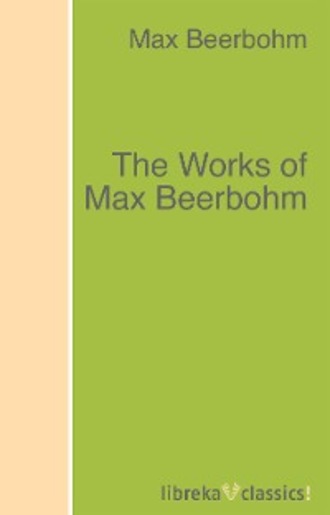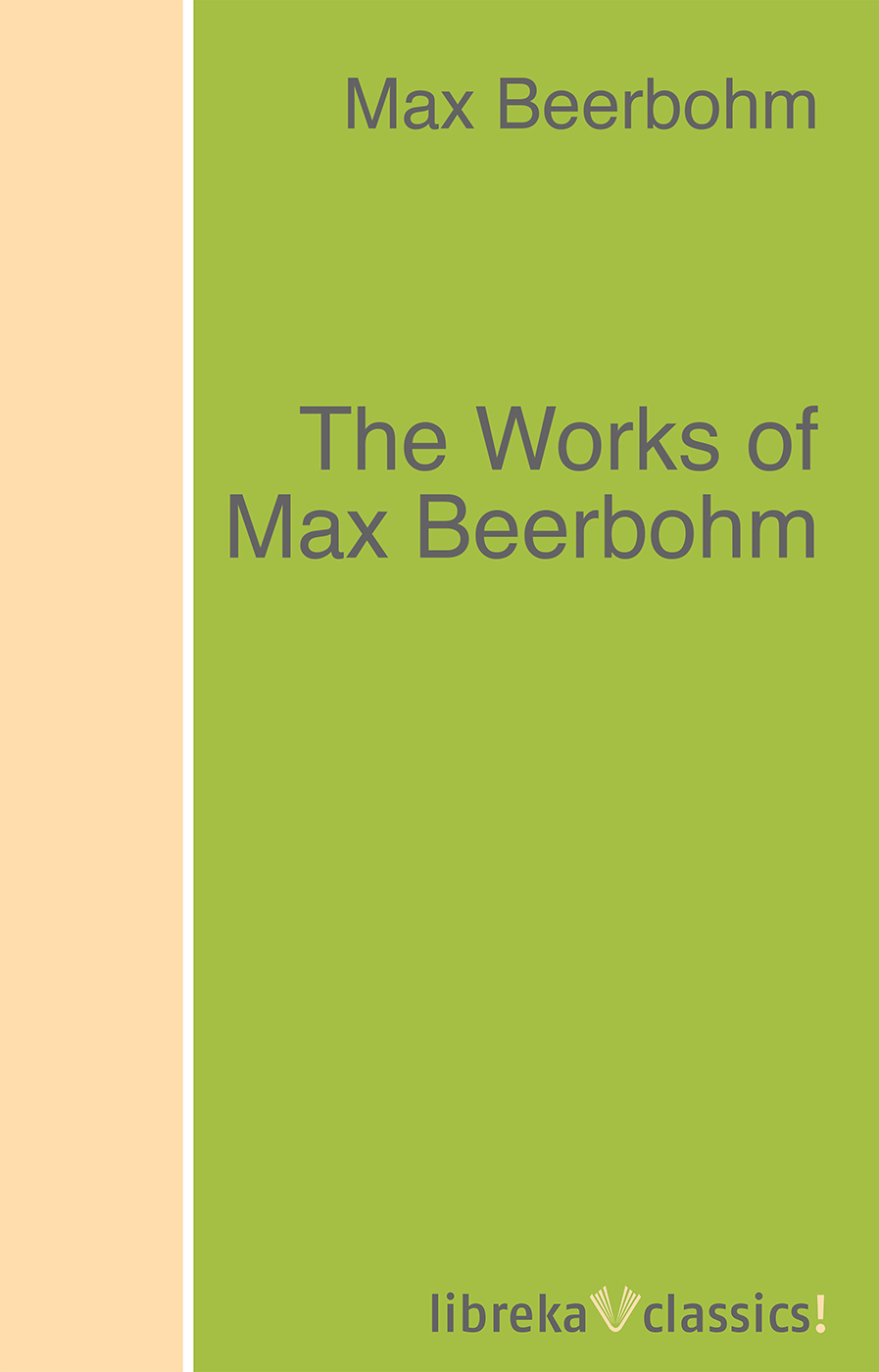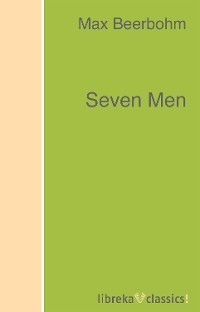
Полная версия
The Works of Max Beerbohm


Titel: The Works of Max Beerbohm
von William Shakespeare, H. G. Wells, Henry Van Dyke, Thomas Carlyle, Oscar Wilde, Joseph Conrad, Henry James, Anthony Hope, Henry Fielding, Giraldus Cambrensis, Daniel Defoe, Grammaticus Saxo, Edgar Rice Burroughs, Hugh Lofting, Agatha Christie, Sinclair Lewis, Eugène Brieux, Upton Sinclair, Booth Tarkington, Sax Rohmer, Jack London, Anna Katharine Green, Sara Jeannette Duncan, Xenophon, Alexandre Dumas père, John William Draper, Alice Christiana Thompson Meynell, Bram Stoker, Honoré de Balzac, William Congreve, Louis de Rougemont, Nikolai Vasilievich Gogol, Rolf Boldrewood, François Rabelais, Lysander Spooner, B. M. Bower, Henry Rider Haggard, William Hickling Prescott, Lafcadio Hearn, Robert Herrick, Jane Austen, Mark Twain, Mary Roberts Rinehart, Charles Babbage, Kate Douglas Smith Wiggin, Frank L. Packard, George Meredith, John Merle Coulter, Irvin S. Cobb, Edwin Mims, John Tyndall, Various, Charles Darwin, Sidney Lanier, Henry Lawson, Niccolò Machiavelli, George W. Crile, Théophile Gautier, Noah Brooks, James Thomson, Zane Grey, J. M. Synge, Virginia Woolf, Conrad Aiken, Edna St. Vincent Millay, Helen Cody Wetmore, Ayn Rand, Sir Thomas Malory, Gustave Flaubert, Edmond Rostand, Charlotte Brontë, Edith Wharton, Giles Lytton Strachey, Myrtle Reed, Ernest Bramah, Jules Verne, H. L. Mencken, H. Stanley Redgrove, Victor Lefebure, Edna Lyall, John Masefield, Charles Kingsley, Robert Burns, Edgar Lee Masters, Victor [pseud.] Appleton, Ellis Parker Butler, Mary Lamb, Charles Lamb, Johann Wolfgang von Goethe, Kenneth Grahame, Charles Dickens, John Ruskin, John Galt, James J. Davis, Owen Wister, William Blades, Sir Hall Caine, Sir Max Beerbohm, Baron Edward John Moreton Drax Plunkett Dunsany, Bret Harte, E. Phillips Oppenheim, Thomas Henry Huxley, A. B. Paterson, John N. Reynolds, Walter Dill Scott, Hans Gustav Adolf Gross, T. S. Eliot, Walt Whitman, Arthur Ransome, Jane Addams, Elizabeth, David Lindsay, Helen Bannerman, Charles A. Oliver, J. M. Barrie, Robert F. Murray, Andrew Lang, Jerome K. Jerome, Francis Thompson, Sydney Waterlow, Andrew Dickson White, Benjamin N. Cardozo, Karl Marx, Edouard Louis Emmanuel Julien Le Roy, Margaret Hill McCarter, Sir Donald Mackenzie Wallace, Howard Trueman, L. M. Montgomery, Frank T. Bullen, Baron Alfred Tennyson Tennyson, Jonathan Nield, Henry Wadsworth Longfellow, Charles Reade, Ouida, Washington Irving, Benjamin Louis Eulalie de Bonneville, Sir Walter Scott, Stewart Edward White, Arthur Hugh Clough, Baron Edward Bulwer Lytton Lytton, C.-F. Volney, T. Troward, graf Leo Tolstoy, Christopher Morley, James Madison, Alexander Hamilton, John Jay, Gilbert White, Percival Lowell, Frederick Marryat, Robert Graves, Thomas Holmes, Wilkie Collins, Maria Edgeworth, Katherine Mansfield, E. Nesbit, Olive Schreiner, Jeronimo Lobo, O. Henry, James Slough Zerbe, Donald Ogden Stewart, Johanna Spyri, Eleanor H. Porter, William Tatem Tilden, Sol Plaatje, Rafael Sabatini, William Makepeace Thackeray, George Gissing, Maksim Gorky, Baron Thomas Babington Macaulay Macaulay, H. G. Keene, Saki, R. B. Cunninghame Graham, Thomas Hughes, David Nunes Carvalho, Vicente Blasco Ibáñez, Carry Amelia Nation, John Fiske, Bernard Shaw, Elbridge Streeter Brooks, William Holmes McGuffey, Edward Everett Hale, Louis Ginzberg, Chester K. Steele, Christopher Marlowe, Plato, John Lord, Shakespeare, Martin Luther, Frances Hodgson Burnett, Howard Pyle, Charles Morris, Edward Carpenter, Maurice Leblanc, James Boswell, William Osler, William Ernest Henley, Theron Q. Dumont, Horatio Alger, Abraham Myerson, Joel Benton, Eden Phillpotts, Anonymous, Robert Louis Stevenson, Lloyd Osbourne, Cleland Boyd McAfee, Robert Williams Wood, H. C. Andersen, Edna Ferber, James Stephens, John Jacob Astor, Alexandre Dumas fils, Hilda Conkling, J. Storer Clouston, Julian Hawthorne, Ernest Albert Savage, Mary Eleanor Wilkins Freeman, Fernando de Rojas, Richard Harding Davis, Charles Whibley, Thomas Dixon, Sir Arthur Conan Doyle, George MacDonald, Thomas H. Burgoyne, Belle M. Wagner, Émile Gaboriau, à Kempis Thomas, United States. Central Intelligence Agency, Herbert Darling Foster, John Chipman Farrar, Lucius Apuleius, Olive Gilbert, Sojourner Truth, Arthur Judson Brown, Burbank L. Todd, Gaston Leroux, Margaret Sanger, Jr. Martin Luther King, Mary Johnston, S. A. Reilly, G. K. Chesterton, Elizabeth Cleghorn Gaskell, George Iles, E. W. Hornung, Edward Huntington Williams, Henry Smith Williams, Nathaniel W. Stephenson, Ellen Marriage, Homer, Anton Pavlovich Chekhov, J. F. C. Hecker, John Milton, Natalie Sumner Lincoln, Baroness Emmuska Orczy Orczy, Thomas Bailey Aldrich, Mary Esther Miller MacGregor, William MacLeod Raine, Earl Derr Biggers, Helen Nicolay, Ruth Ogden, Thornton W. Burgess, Mary Murdoch Mason, Auguste Groner, John Lawson, Emma Wolf, Theodore Dreiser, Roger Ascham, John Charles McNeill, Owen Meredith, L. Adams Beck, Rudyard Kipling
ISBN 978-3-7429-1798-0
Alle Rechte vorbehalten.
Es ist ohne vorherige schriftliche Erlaubnis nicht gestattet, dieses Werk im Ganzen oder in Teilen zu vervielfältigen oder zu veröffentlichen.
THE WORKS OF MAX BEERBOHM
by Max Beerbohm
With a Bibliography by John Lane
Original Transcriber's Note:
I have transliterated the Greek passages. Here are some approximate translations:
—philomathestatoi ton neaniskon: some of the youths most eager for knowledge
—Nêpios: childish
—hexeis apodeiktikai: things that can be proven (Aristotle, Nic. Ethics)
—eidôlon amauron: shadowy phantom (phrase used by Homer in The Odyssey to describe the specter Athena sends to comfort Penelope)
—all' aiei: but always
—tina phôta megan kai kalon edegmen: I received some great and beautiful light
Contents
Dandies and Dandies A Good Prince 1880 King George The Fourth The Pervasion of Rouge Poor Romeo! Diminuendo THE WORKS OF MAX BEERBOHM A BIBLIOGRAPHY THE BIBLIOGRAPHY OF THE WORKS OF MAX BEERBOHM
Dandies and Dandies
How very delightful Grego's drawings are! For all their mad perspective and crude colour, they have indeed the sentiment of style, and they reveal, with surer delicacy than does any other record, the spirit of Mr. Brummell's day. Grego guides me, as Virgil Dante, through all the mysteries of that other world. He shows me those stiff-necked, over-hatted, wasp-waisted gentlemen, drinking Burgundy in the Café des Milles Colonnes or riding through the village of Newmarket upon their fat cobs or gambling at Crockford's. Grego's Green Room of the Opera House always delights me. The formal way in which Mdlle. Mercandotti is standing upon one leg for the pleasure of Lord Fife and Mr. Ball Hughes; the grave regard directed by Lord Petersham towards that pretty little maid-a-mischief who is risking her rouge beneath the chandelier; the unbridled decorum of Mdlle. Hullin and the decorous debauchery of Prince Esterhazy in the distance, make altogether a quite enchanting picture. But, of the whole series, the most illuminative picture is certainly the Ball at Almack's. In the foreground stand two little figures, beneath whom, on the nether margin, are inscribed those splendid words, Beau Brummell in Deep Conversation with the Duchess of Rutland. The Duchess is a girl in pink, with a great wedge-comb erect among her ringlets, the Beau très dégagé, his head averse, his chin most supercilious upon his stock, one foot advanced, the gloved fingers of one hand caught lightly in his waistcoat; in fact, the very deuce of a pose.
In this, as in all known images of the Beau, we are struck by the utter simplicity of his attire. The 'countless rings' affected by D'Orsay, the many little golden chains, 'every one of them slighter than a cobweb,' that Disraeli loved to insinuate from one pocket to another of his vest, would have seemed vulgar to Mr. Brummell. For is it not to his fine scorn of accessories that we may trace that first aim of modern dandyism, the production of the supreme effect through means the least extravagant? In certain congruities of dark cloth, in the rigid perfection of his linen, in the symmetry of his glove with his hand, lay the secret of Mr. Brummell's miracles. He was ever most economical, most scrupulous of means. Treatment was everything with him. Even foolish Grace and foolish Philip Wharton, in their book about the beaux and wits of this period, speak of his dressing-room as 'a studio in which he daily composed that elaborate portrait of himself which was to be exhibited for a few hours in the clubrooms of the town.' Mr. Brummell was, indeed, in the utmost sense of the word, an artist. No poet nor cook nor sculptor, ever bore that title more worthily than he.
And really, outside his art, Mr. Brummell had a personality of almost Balzacian insignificance. There have been dandies, like D'Orsay, who were nearly painters; painters, like Mr. Whistler, who wished to be dandies; dandies, like Disraeli, who afterwards followed some less arduous calling. I fancy Mr. Brummell was a dandy, nothing but a dandy, from his cradle to that fearful day when he lost his figure and had to flee the country, even to that distant day when he died, a broken exile, in the arms of two religieuses. At Eton, no boy was so successful as he in avoiding that strict alternative of study and athletics which we force upon our youth. He once terrified a master, named Parker, by asserting that he thought cricket 'foolish.' Another time, after listening to a reprimand from the headmaster, he twitted that learned man with the asymmetry of his neckcloth. Even in Oriel he could see little charm, and was glad to leave it, at the end of his first year, for a commission in the Tenth Hussars. Crack though the regiment was—indeed, all the commissions were granted by the Regent himself—young Mr. Brummell could not bear to see all his brother-officers in clothes exactly like his own; was quite as deeply annoyed as would be some god, suddenly entering a restaurant of many mirrors. One day, he rode upon parade in a pale blue tunic, with silver epaulettes. The Colonel, apologising for the narrow system which compelled him to so painful a duty, asked him to leave the parade. The Beau saluted, trotted back to quarters and, that afternoon, sent in his papers. Henceforth he lived freely as a fop, in his maturity, should.
His début in the town was brilliant and delightful. Tales of his elegance had won for him there a precedent fame. He was reputed rich. It was known that the Regent desired his acquaintance. And thus, Fortune speeding the wheels of his cabriolet and Fashion running to meet him with smiles and roses in St. James's, he might well, had he been worldly or a weakling, have yielded his soul to the polite follies. But he passed them by. Once he was settled in his suite, he never really strayed from his toilet-table, save for a few brief hours. Thrice every day of the year did he dress, and three hours were the average of his every toilet, and other hours were spent in council with the cutter of his coats or with the custodian of his wardrobe. A single, devoted life! To Whités, to routs, to races, he went, it is true, not reluctantly. He was known to have played battledore and shuttlecock in a moonlit garden with Mr. Previté and some other gentlemen. His elopement with a young Countess from a ball at Lady Jersey's was quite notorious. It was even whispered that he once, in the company of some friends, made as though he would wrench the knocker off the door of some shop. But these things he did, not, most certainly, for any exuberant love of life. Rather did he regard them as healthful exercise of the body and a charm against that dreaded corpulency which, in the end, caused his downfall. Some recreation from his work even the most strenuous artist must have; and Mr. Brummell naturally sought his in that exalted sphere whose modish elegance accorded best with his temperament, the sphere of le plus beau monde. General Bucknall used to growl, from the window of the Guards' Club, that such a fellow was only fit to associate with tailors. But that was an old soldier's fallacy. The proper associates of an artist are they who practise his own art rather than they who—however honourably—do but cater for its practice. For the rest, I am sure that Mr. Brummell was no lackey, as they have suggested. He wished merely to be seen by those who were best qualified to appreciate the splendour of his achievements. Shall not the painter show his work in galleries, the poet flit down Paternoster Row? Of rank, for its own sake, Mr. Brummell had no love. He patronised all his patrons. Even to the Regent his attitude was always that of a master in an art to one who is sincerely willing and anxious to learn from him.
Indeed, English society is always ruled by a dandy, and the more absolutely ruled the greater that dandy be. For dandyism, the perfect flower of outward elegance, is the ideal it is always striving to realise in its own rather incoherent way. But there is no reason why dandyism should be confused, as it has been by nearly all writers, with mere social life. Its contact with social life is, indeed, but one of the accidents of an art. Its influence, like the scent of a flower, is diffused unconsciously. It has its own aims and laws, and knows none other. And the only person who ever fully acknowledged this truth in aesthetics is, of all persons most unlikely, the author of Sartor Resartus. That any one who dressed so very badly as did Thomas Carlyle should have tried to construct a philosophy of clothes has always seemed to me one of the most pathetic things in literature. He in the Temple of Vestments! Why sought he to intrude, another Clodius, upon those mysteries and light his pipe from those ardent censers? What were his hobnails that they should mar the pavement of that delicate Temple? Yet, for that he betrayed one secret rightly heard there, will I pardon his sacrilege. 'A dandy,' he cried through the mask of Teufelsdröck, 'is a clothes-wearing man, a man whose trade, office, and existence consists in the wearing of clothes. Every faculty of his soul, spirit, purse, and person is heroically consecrated to this one object, the wearing of clothes wisely and well.' Those are true words. They are, perhaps, the only true words in Sartor Resartus. And I speak with some authority. For I found the key to that empty book, long ago, in the lock of the author's empty wardrobe. His hat, that is still preserved in Chelsea, formed an important clue.


